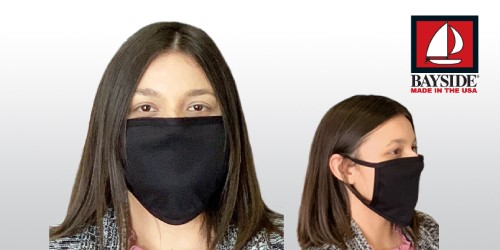April 06, 2020
Suppliers, Distributors Band Together During Pandemic
Industry professionals are teaming up and leaning on each other to make it through these dire times.
One by one, a dozen women pop onto the screen. Kate Ivory relaxes in front of an idyllic cabana with surfboards propped against the wall. Lisa Greyhill sits inside an active – and occasionally noisy – fire station. Renya Nelson has a baby perched on her hip. They exchange pleasantries before quickly getting down to business – discussing how their promotional products businesses can make it through the slowdowns, delays and obstacles created by the coronavirus pandemic.
The outdoor surfing paradise is fake – just one of those virtual backgrounds that have been thriving on videoconferencing apps like Zoom. But the fire station is real (where Greyhill works as a firefighter when she’s not running her promo company Firebrand Global Marketing). So is Nelson’s baby, of course. Also real: the sense of camaraderie between the women in this mastermind group.

“I don’t think I could have navigated this crisis without the help of this group,” says Ivory, owner of GIDI Promotions in Portland, OR. “I would have closed up shop.”
Collaboration and relationship-building have always been coded into the DNA of the promotional products industry. Suppliers and distributors are used to working together to come up with creative solutions for the end-user. And even those in competition are friendly at trade shows and other events. But the coronavirus pandemic has taken that conviviality to another level. Suppliers and distributors are banding together – even working with their competitors – to help get through this crisis.
“We’re being tested as an industry,” says Matthew Lamb, executive vice president of Facilisgroup, the St. Louis, MO-based promotional products technology and partnering organization. “The value we deliver is being tested. Our creativity and adaptability are being tested. As an industry full of small businesses, our resourcefulness is being tested. From what I’ve seen, we’ve responded remarkably well.”
Mastermind Groups & Zoom Happy Hours
Even though the industry can’t gather in-person right now, virtual meetings have taken hold as an effective way of coming together. The mastermind group Nelson, Greyhill and Ivory belong to typically meets via Zoom twice a month and chats constantly on a dedicated Slack channel, says Brenda Speirs, head of Bend, OR-based Buzztag (asi/186668) and the group organizer. With all the uncertainty surrounding the coronavirus pandemic, the group decided to schedule a third Zoom meeting in March. “These are extraordinary times,” Speirs says.
Speirs’ mastermind group had been meeting for about a year before the pandemic crisis, and having a trusted group of peers to turn to now has been invaluable, members say. “I think the walls are just down, and you can show your true colors,” says Ruth Verver, cofounder and partner at Paperclip Promotions (asi/290142) in Austin, TX, and another member of Speirs’ group. “Everyone’s in the same boat.”
Also in the group, Carson Roncketto, chief operating officer at Creative Promo in Fayetteville, AR, agrees: “There really is such a genuine care for each other on a personal level. It’s more than just a business collaboration group.”
Sandee Rodriguez, owner of D & S Designs in Bridgeton, NJ, has been having a similar experience with the private promotional products women’s group she’s in. As the pandemic’s effect on the industry grew and more and more emails flew between members, Rodriguez set up a Zoom meeting to talk about the impact of the coronavirus. “It was really great because everyone’s really working in isolation at this point,” she says. “To look at each other and say, ‘Hi,’ it humanized what we’re going through.”
Rodriguez’s group set up a shared folder on Google and created a spreadsheet to record members’ ideas and create action plans. “We brainstormed different areas we think we can still market to even under these circumstances,” she says. “It’s not just about sharing product ideas. It’s more about methodology, not products. We play at a different level.”
Other promo pros have been scheduling Zoom happy hours. Jon Norris, vice president of operations at Starline (asi/89320) and cofounder of PromoStandards, organized a virtual social event for the tech side of the industry to commiserate about the challenges of enabling your whole team to switch to remote work on very short notice. “It was reassuring to know that other people in the industry were going through the same or similar issues,” Norris says.
Even though the event was thrown together in two days and set for a Thursday evening at 8 p.m., more than 30 people fired up their webcams and logged into the mixer, Norris says. “We connected with people I 100% wouldn’t even have had communication with this year,” he adds.
Joint Efforts for the Greater Good
Many industry suppliers have been shifting their production operations to make face masks and other medical equipment to support health professionals and other front-line workers during the pandemic. These efforts have required suppliers who would typically be in competition to share information and work together.
HanesBrands (asi/59528) worked with the federal government to fast-track FDA approval for its design for cotton face masks, then shared its design with a cooperative consortium of apparel manufacturers that includes SanMar (asi/84863) and Fruit of the Loom (asi/84257). The consortium has been churning out 5 million to 6 million cotton face masks a week for healthcare professionals, via a contract with the federal government.
New York-based Royal Apparel (asi/83731) has been in talks to join the consortium and start producing masks and hospital gowns. The spirit of collaboration between Royal and other Made-in-the-USA apparel manufacturers has been strong, says Glen Brumer, sales director at Royal. “We started having communication with people we normally would never talk to at other Made-in-the-USA companies. … There was this wonderful information exchange,” Brumer says. “It’s almost like we’re all one brand, one company supplying the demands of the country right now. … It’s been pretty intense.”
Many distributors have been connecting with their supplier partners to help get masks and other personal protective equipment into the hands of people who need it. Texas-based Kinetic Promotional Products Services (asi/466584) has been working with New Jersey supplier LBU Inc. (asi/65952), which has been making about 20,000 masks a day for healthcare workers. “We’re running social media ads and email marketing to promote their Made-in-America product,” says Darlene Gagnon, cofounder of Kinetic.

Nick Mirabile of Stran Promotional Products is selling nonsurgical masks being produced by AST Sportswear, owner of the Bayside brand.
The two firms have been exchanging phone calls and text message at all hours, supporting each other to make sure the job gets done. “You feel as distributors you have a true partner, and on the flip side, we’re supporting their factory and keeping people employed by promoting their product and getting orders,” Gagnon says. “It’s a closeness you normally wouldn’t have when processing orders and moving on to the next client. … You really know you’re fighting something a lot deeper than getting an order.
“You realize how much we need each other to make our business go around. It shows me the power of our industry and the significance of walking arm-in-arm not just to get an order, but to save our businesses.”
Stran Promotional Products (asi/337725) and AST Sportswear Inc. (asi/30244), maker of the Bayside brand, had already been in collaboration on a massive manufacturing program for months, creating hundreds of thousands of USA-made caps and T-shirts for the U.S. Census, but the coronavirus forced both companies to shift gears, according to Nick Mirabile, vice president of merchandise and licensing at Stran. Bayside is now making masks and gowns, and Stran is offering them to hospitals, universities and other health facilities. “We’ve agreed to favorable terms so that the new products and finances work for both parties,” Mirabile says. “As a distributor, I want to support my best suppliers, and as a supplier, Bayside wants to keep a favorable relationship with their best customers, so we work together in this time of crisis to do what’s fair for both parties and the end-user community.”
There are other ways the industry has been collaborating, such as creating T-shirt fundraisers to help restaurants and other local businesses stay vital when they can’t open their doors to customers. Screen printer Tiny Little Monster approached businesses in the St. Louis area, offering to design a branded T-shirt, one per business, then sell them online – $10 from each sale would go to the local business, the other $10 would go to Tiny Little Monster. There are more than 130 businesses represented in Tiny Little Monster’s Here for Good online shop. Tiny Little Monster, which uses InkSoft’s business platform for the decorated apparel industry, then shared the Here for Good concept with other InkSoft customers. It’s sparked a nationwide movement, says JP Hunt, a partner and cofounder of InkSoft.
Jordan Bressler, president and CEO of Deerfield, IL-based distributor TSMGI, has been sharing the wisdom he gained from surviving the 2008-09 recession with other distributors, but he’s gone beyond that to help some competitors stay in business. “We’ve had a couple of individuals who just don’t have the cash flow to support their business and we’re helping them with filling orders and giving them a commission,” he says.
“I would hope some of the other companies are doing the same kind of things we are,” Bressler says. “This is the time that all of our industry leaders should be banding together.”